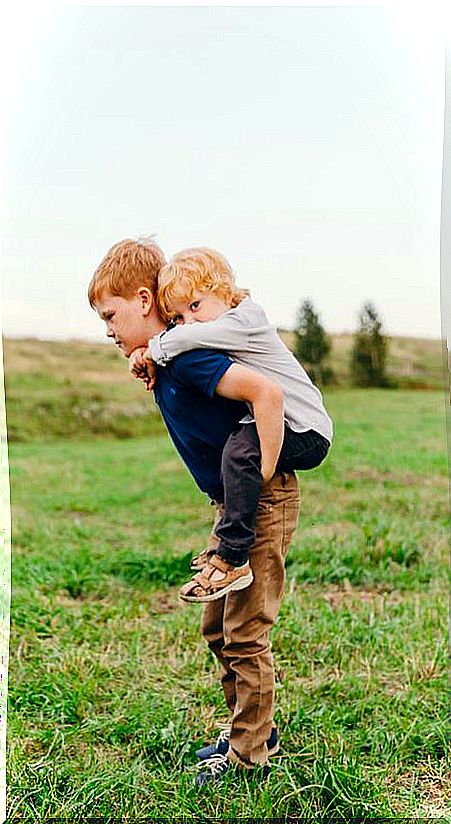I Was Forced To Take Care Of My Little Brother
In many families, older brothers are given the responsibility of taking care of the little ones. This causes them some deficiencies, which they drag for life. When these people come to recognize how unfair this obligation was, they begin to heal.

The order of birth of a child in your family can influence the development of his personality. A very common case is that of older siblings who are responsible for the care of the little ones.
This excess of responsibility can end up causing, among many other damages, anxiety attacks, lack of self-esteem, frustration and depression.
However, it is necessary to remember that this does not have to happen to all children who are older siblings. In addition to the order of arrival, many other factors play a role in personality development, such as parenting style, parental character, family customs, etc.
The “caretaker” tag
When he started coming to therapy, Pablo felt responsible for everything that happened to his younger brother. He always lived worried that something bad might happen to him.
She cared so much for him that she neglected her own family. In fact, he was about to destroy his marriage due to the continuous arguments that this situation generated.
Pablo was not aware of the deep programming that he had been subjected to as a child to take care of his little brother.
When a sibling is born, it is common for relatives to approach the older brother to show him how mature he is and how he has to take care of his baby brother.
Even if the “oldest” is 2 or 3 years old, he begins to receive messages such as “you have to help your parents”, “now you have to be very responsible” or “you will have to take care of your little brother”.
Most of these messages are not malicious and seek to give a place of importance to the older brother so that he is not jealous of the newcomer. However, in certain cases, when parents transform these warnings into obligations, a heavy slab falls on these little ones.
Early ripening
Regardless of how old the child is, he is forced to mature suddenly to take care of his brother. Somehow, he loses the status of a child, he can no longer play and enjoy as he should because he has the responsibility of taking care of the health and safety of the little one.
This is what happened to Paul. His brother was born when he was 3 years old and, according to what he told me in our sessions, he always remembered watching over and taking care of him.
A scene from his childhood that marked him deeply was one day, when he was 6 years old (and his brother 3), in which his parents, for some reason, were absent from home and left him in the care of the little one. The latter, after a few minutes, threw a glass vase that shattered on the floor.
The boy was scared and, from the shock, he fell on the remains of the vase and made a small cut on his hand. It was nothing major, but it was shocking enough to traumatize his older brother.
Pablo felt absolutely responsible for what happened, so much so that he came to think that his younger brother was going to die because of his lack of attention.
When his parents arrived and found out what had happened, instead of taking responsibility, they blamed little Pablo for the accident and punished him for it.
At his young age, he was not able to realize the abuse involved in leaving him in the care of his brother.
Assuming the role that his parents had given him, he promised to redouble his efforts so that nothing bad would happen to his brother again.
An excess of worry
As they grew older, Pablo’s care was radicalized, exceeding the normal limits of a sibling relationship. He was always concerned about what his brother was doing and watched his every move.
The fear that if he let his guard down, something serious would happen to him was always present. He even had numerous nightmares in which his brother died in the most bizarre ways. in all of them, the fault of the death of the brother was always his.
In the present, the relationship between the two brothers had been damaged by this pattern of responsibility.
The little boy demanded space and independence, but Pablo was unable to lower his level of demand.
In order to have a healthy relationship with his brother, Pablo had to admit that he was also very young and that it was his parents who should have taken care of them both. It wasn’t fair that they charged him with such responsibility.
How to abandon this pattern
Our work, in therapy, focused on reprogramming this idea of excessive caring, freeing himself of guilt for anything that could happen to his brother. This change led to a series of improvements in all aspects of Pablo’s social life.
The younger brother (who was already 42 years old) stopped feeling watched and pressured, and they were able to build a much healthier and more balanced relationship, in which both took care of each other as brothers, but far from any pressure.
On the other hand, Pablo was able to rebuild his relationship with his wife and children, whom he had almost abandoned due to his problem.









